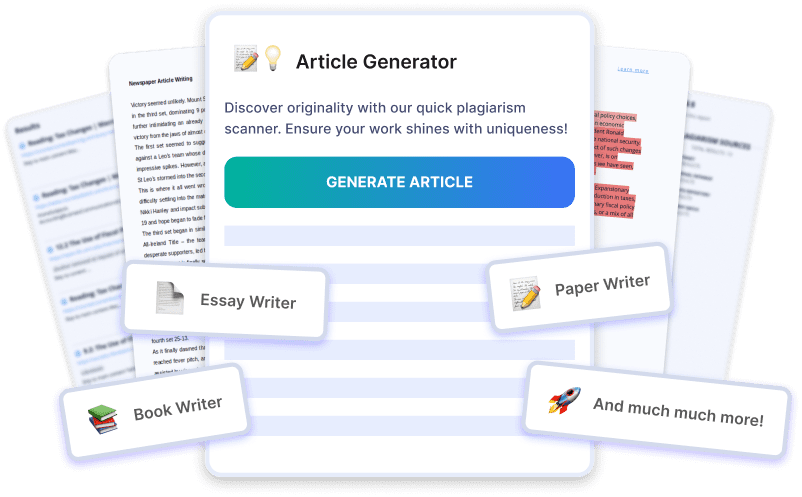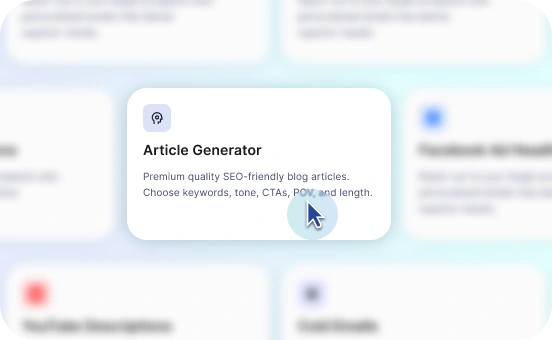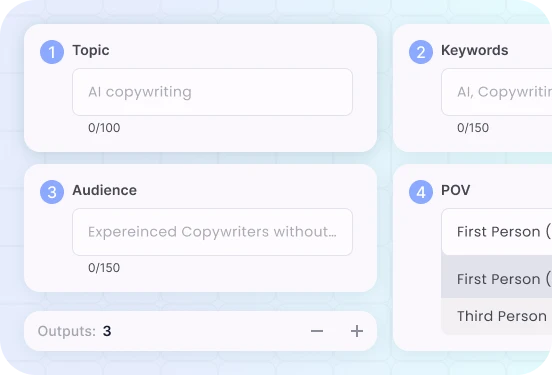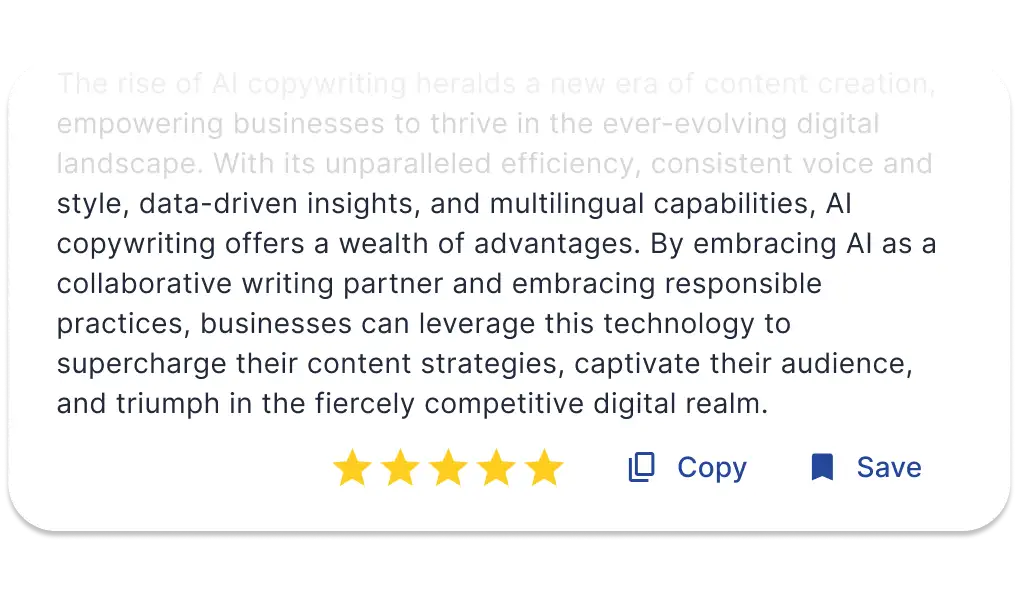AI Thesis Statement: Power Your Research
Craft a compelling AI thesis statement effortlessly with Justdone.ai's advanced tools and expert guidance.
Try Justdone
Thesis Power Pack
Refine Thesis
Leverage advanced AI to refine and optimize your thesis statement for maximum impact.
Ensure Clarity
Guarantee a clear and coherent thesis statement with AI-powered precision and insight.
Enhance Credibility
Elevate the credibility and authority of your thesis statement with Justdone.ai's expert tools.
Optimize Your Writing with AI Thesis Statement Tools
Streamline Your Writing Process
When it comes to crafting a compelling thesis statement, AI writing tools can be invaluable. These advanced platforms offer a range of features designed to enhance and streamline the writing process. By using AI tools for writing, you can generate well-crafted thesis statements quickly and efficiently, saving valuable time and effort.
AI tools for writing provide intelligent suggestions and prompts to help refine your thesis statement. These online writing tools utilize advanced algorithms to analyze your content and offer insightful recommendations for improvement. With the best AI writing tools at your disposal, you can elevate the quality of your thesis statements and enhance the overall impact of your academic work.
Try Justdone ->
Enhance Writing Accuracy and Clarity
The precision and accuracy offered by AI tools for writing can significantly enhance the clarity of your thesis statement. These writing AI tools can help identify grammatical errors, improve sentence structure, and ensure coherence throughout your writing. By leveraging the benefits of using AI writing tools, you can elevate the overall quality and impact of your thesis statement, effectively communicating your ideas with precision and clarity.
Utilizing the best AI writing tools empowers you to refine your thesis statement with confidence, knowing that your content is polished and error-free. With online writing tools, you can achieve a higher level of writing proficiency, making your thesis statement more compelling and impactful for your audience.
Try Justdone ->
Access a Wealth of Writing Resources
Incorporating AI tools for writing into your workflow provides access to a wealth of valuable resources. These writing tools offer extensive libraries of writing examples, templates, and reference materials to inspire and guide your thesis statement development. By utilizing the best AI writing tools, you can tap into a diverse range of writing resources, enriching your content and strengthening the foundation of your thesis statement.
AI writing tools also provide real-time feedback and suggestions, empowering you to fine-tune your thesis statement as you write. With access to online writing tools, you can seamlessly integrate valuable insights and resources into your writing process, elevating the quality and impact of your thesis statement.
Try Justdone ->
Maximize Your Writing Potential with the Best AI Thesis Statement Tools
Utilize Advanced Features
When using AI tools for writing thesis statements, be sure to explore and leverage the advanced features offered by the platform. These may include intelligent suggestion algorithms, grammar checkers, and content enhancement tools. By maximizing the use of these best writing tools, you can refine and elevate the quality of your thesis statement with precision and efficiency.
Utilizing the best AI writing tools empowers you to refine your thesis statement with confidence, knowing that your content is polished and error-free. With online writing tools, you can achieve a higher level of writing proficiency, making your thesis statement more compelling and impactful for your audience.
Stay Updated with Writing AI Tools
To make the most of AI thesis statement tools, stay updated with the latest advancements and updates in the field of writing AI tools. Continuous learning and adaptation to new features and improvements can enhance your proficiency in crafting compelling thesis statements. By staying informed about the best writing ai tools, you can ensure that your writing remains at the forefront of excellence.
Staying updated with the latest features and capabilities of AI writing tools enables you to harness the full potential of these advanced platforms, refining your thesis statement with the latest innovations and enhancements.
Utilize Writing Tools Examples
Leverage the power of writing tools examples to gain inspiration and insight for crafting impactful thesis statements. Many AI writing tools offer a repository of exemplary writing samples and templates that can serve as valuable references for your own thesis statement. By studying and utilizing these best writing tools examples, you can enhance the creativity and effectiveness of your thesis statement.
Drawing inspiration from a diverse range of writing tools examples can enrich your thesis statement, infusing it with fresh perspectives and innovative approaches that captivate and engage your audience.
Harness the Benefits of AI Writing Tools
Take full advantage of the benefits of using AI writing tools to optimize your thesis statement. These tools offer invaluable assistance in refining your writing, from grammar and style enhancements to content organization. By harnessing the benefits of the best AI tools for writing, you can elevate the impact and effectiveness of your thesis statement, showcasing your ideas with clarity and precision.
By leveraging the benefits of using AI writing tools, you can streamline your writing process, enhance your writing accuracy, and access a wealth of resources to enrich your thesis statement, ultimately maximizing the potential of your academic work.
Embrace Collaborative Writing
Consider embracing collaborative writing with AI tools for writing thesis statements. Many platforms offer collaborative features that allow multiple users to contribute and refine the thesis statement, fostering a collective approach to enhancing the content. By embracing collaborative writing with the best AI writing tools, you can leverage diverse perspectives and insights to create a compelling and impactful thesis statement.
Collaborative writing with AI tools enables you to harness the collective expertise and creativity of multiple contributors, enriching your thesis statement with a breadth of knowledge and ideas.
How to use Article Generator
- 1
Choose a template
Select the necessary template from the template gallery.

- 2
Provide more details
Fill out the carefully selected inputs to create the best quality of output content.

- 3
Enjoy the results
Copy, save for later, rate the output or hit regenerate button.

Unlock Creativity and Precision with AI Thesis Statement Tools
Discover the power of AI thesis statement tools and unlock the potential for crafting compelling and precise thesis statements. Dive into the world of advanced writing AI tools and revolutionize your writing process with innovative features and resources.
Craft a well-structured and impactful thesis statement for a research paper on the influence of technology on modern education.
In the rapidly evolving landscape of modern education, the influence of technology has become a pivotal factor shaping the learning environment. Crafting a well-structured and impactful thesis statement for a research paper on this topic requires a comprehensive understanding of the educational landscape and the intricate role of technology within it.
By leveraging AI thesis statement tools, I can analyze the complex relationship between technology and modern education, identifying key insights and trends that can inform a compelling thesis statement. These advanced writing AI tools enable me to refine the thesis statement with precision and clarity, ensuring that it effectively captures the transformative impact of technology on contemporary learning paradigms.
Furthermore, utilizing the best AI writing tools empowers me to access a wealth of resources and examples related to the influence of technology on education. This allows me to draw inspiration from diverse perspectives and innovative approaches, enriching the thesis statement with fresh insights and compelling narratives that resonate with the academic audience.
With the collaborative writing features offered by AI tools, I can also engage in a collective exploration of ideas and perspectives, refining the thesis statement through collaborative input and expertise. This collaborative approach enhances the depth and accuracy of the thesis statement, ensuring that it reflects a comprehensive understanding of the multifaceted impact of technology on modern education.
In essence, by embracing AI thesis statement tools, I can unlock creativity and precision in crafting a thesis statement that encapsulates the dynamic interplay between technology and modern education, providing valuable insights and perspectives for academic research and discourse.
Develop a compelling thesis statement for an analysis of artificial intelligence's portrayal in contemporary literature.
Exploring the portrayal of artificial intelligence in contemporary literature unveils a rich tapestry of themes and narratives that reflect the evolving relationship between humanity and technology. Crafting a compelling thesis statement for this literary analysis requires a nuanced understanding of the multifaceted representations of artificial intelligence across diverse literary works.
Through the utilization of AI thesis statement tools, I can delve into the intricate nuances of artificial intelligence's portrayal in contemporary literature, analyzing the underlying themes and characterizations with precision and insight. These advanced writing AI tools provide valuable prompts and suggestions to refine the thesis statement, ensuring that it encapsulates the complexities and depth of the literary representations of artificial intelligence.
Moreover, leveraging the best AI writing tools allows me to access a diverse array of writing tools examples related to the portrayal of artificial intelligence in literature. This enables me to draw inspiration from varied perspectives and narrative constructs, enriching the thesis statement with compelling insights and thought-provoking analyses that resonate with literary enthusiasts and scholars.
The collaborative writing features offered by AI tools also facilitate a collective exploration of ideas and interpretations, refining the thesis statement through collaborative input and expertise. This collaborative approach enhances the depth and richness of the thesis statement, ensuring that it encapsulates a comprehensive analysis of artificial intelligence's portrayal in contemporary literature.
In essence, by harnessing AI thesis statement tools, I can unlock the creative potential to craft a thesis statement that captures the captivating interplay between artificial intelligence and literature, offering profound insights and interpretations for literary analysis and discourse.